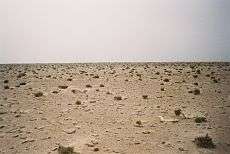Sanmao (author)
| Chen Mao Ping (陳懋平) | |
|---|---|
| Born |
March 26, 1943 Chongqing, Sichuan, China |
| Died | January 4, 1991 (aged 47) |
| Pen name | San Mao (三毛) |
| Occupation | Novelist |
| Nationality | Republic of China, Taiwan |
| Period | 1943-1991 |
| Spouse |
Jose Maria Quero y Ruiz (m.1973-1979) Born on October 9, 1951, died on September 30, 1979 (aged 27) |
Sanmao (三毛) (March 26, 1943 – January 4, 1991) was a novelist, translator and writer. Born as Chen Mao Ping (陳懋平), the writer's pseudonym was adopted from a character of acclaimed caricaturist Zhang Leping's most famous work, entitled Sanmao.[1] In English she was also known as Echo or Echo Chan, the first name she used in Latin script, based on the homonymous Greek nymph.
Her work ranges from autobiographical writing, to travel writing and reflective novels, to translations of European comic books. Sanmao studied philosophy and taught German, in addition to a serious later career in writing.
Early years
Chen Mao Ping's family is originally from Dinghai, Zhejiang Province.[2] However, she was born in Chongqing, grew up in Nanjing, and moved to Taiwan with family in 1948. She studied and graduated from the Department of Philosophy at Chinese Culture University. Her father, Chen Siqing, was a lawyer. Her mother was Miao Jinlan.[3]
Sanmao claims to have read the Dream of the Red Chamber, a famous Chinese classic, in the second half of fifth grade. In elementary school, she often skipped school to read literature. Throughout her education she had conflicts with her teachers, including an incident in which she said she wanted to be a garbage collector when she grew up, which her teacher said was unacceptable. During her second year of high school, she shut herself up due to a traumatic incident, and refused to go to school. Her father bought many books for her to read at home, and allowed her to take piano lessons and practice painting.
Life and career
From 1965 to 1969, she studied philosophy in Taiwan, and it was during this period that she experienced her first love. Things didn't work out, so she planned to go as far away as possible, and ended up in Spain.
Between 1967 and 1970 she studied in Spain, and then in Germany, and later found work in a law library in the state of Illinois in the United States. Eventually, she returned to Taiwan and began working as a German teacher. Her fiance, a 45-year-old German man, died of a heart attack, and she again left Taiwan and returned to Spain.

In 1976 she published her first work, the autobiographical The Stories of the Sahara, which was on her experiences living in the Sahara together with her Spanish husband Jose, whom she first met in Madrid and later married in 1973 while living together in the then Spanish-controlled Western Sahara. Part travelogue and part memoir, it was an eye-opening account of life and love in the desert, and quickly established Sanmao as a travel writer with a unique voice and perspective. Following the book's immense success in Taiwan, Mainland China as well as Hong Kong, her early writings were collected in a second book, published under the title Gone With the Rainy Season. She continued to publish her writings, and her experiences in the Sahara and the Canary Islands were published in several more books.
In 1979 her husband drowned while diving. In 1980 she returned to Taiwan, and in November of the same year, she travelled to Central and South America, on commission from Taiwanese publishers. These experiences were recorded in subsequent writings. From 1981 to 1984, she taught and lectured at her alma mater the Chinese Cultural University in Taiwan. After this point, she decided to dedicate herself fully to writing.
Sanmao's books deal mainly with her own experiences studying and living abroad. They were extremely well received not only in Taiwan, but also in mainland China, and they remain popular reads today. From 1976 to the time of her death in 1991, Sanmao published more than 20 books. She also translated the comic Mafalda from Spanish to Chinese.
Death
In 1991, at the age of 47, Sanmao died in a hospital in Taipei, having hanged herself with a pair of silk stockings. This took place days after a cancer scare and losing the Hong Kong movie award for her script to the film Red Dust (滾滾紅塵), a loss which she took poorly.
Some fans, most notably Zhang Jinran, claimed her death was a murder. Her apparent suicide came as a shock to many of her readers and was accompanied by public expressions of grief throughout the Chinese-speaking world. There has been much speculation regarding the reason for her suicide: a cancer scare, disappointment over losing the Golden Horse Film Festival and Awards for her script to the film Red Dust, or depression over her husband Jose's death, which had occurred 12 years earlier.[4]
References
| Library resources about Sanmao (author) |
| By Sanmao (author) |
|---|
- ↑ Mo, Weimin; Wenju Shen (September 2006). "Sanmao, the Vagrant : Homeless Children of Yesterday and Today". Children's Literature In Education 37 (3): 267–285.
- ↑ http://english.cri.cn/8706/2013/01/29/2963s745804.htm
- ↑ Chen Shaohua.(November 30, 2007). San Mao-Taiwan's Wandering Writer.In All-China Women's Federation. Retrieved from http://www.womenofchina.cn/html/womenofchina/report/88989-1.htm.
- ↑ Tamara Treichel.( March 11, 2013). San Mao:The Echo Effect.People's Daily Online.Retrieved from http://english.peopledaily.com.cn/90782/8162070.html
|